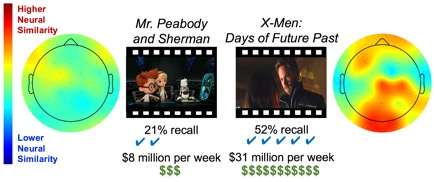Cerf and Barnett test their technique on their own brains at the AMC Theatres in Northbrook, Illinois. Credit: Northwestern University
Through a provocative new neuroscience-based marketing research method developed at Northwestern's Kellogg School of Management, brain waves of viewers watching trailers in movie theaters produced surprisingly accurate information about how well the films did at the box office upon release.
Through the study, which included 122 moviegoers, researchers were able to determine what type of content is most engaging and memorable to consumers.
Neuroscience and business professor Moran Cerf and neuroscience Ph.D. researcher Sam Barnett developed a new technique using brain monitoring (electroencephalography; EEG). They measured participants' level of engagement with advertisements in real time by analyzing their brain waves.
"It turns out, when our brains are truly engaged with the content we are watching, they essentially look the same as one another," Barnett said.
Each film trailer was assigned a neural similarity score based on the extent to which viewers had similar brain patterns. Similar brain activity is a sign of greater engagement with the content. Higher neural similarity scores correlated directly with improved memory of the movie trailers and higher ticket sales when the films were released.
Out of more than a dozen film trailers watched during the course of the four-week study, "X-Men: Days of Future Past" produced the highest neural similarity score, was remembered by the majority of viewers and ultimately earned the highest box office sales. On the other hand, "Mr. Peabody & Sherman" produced the lowest level of neural similarity, was only remembered by one out of five participants and generated a quarter of the weekly ticket sales that "X-Men" delivered.
The neural similarity method also identified the peak moments of engagement. Movie trailers that achieve that moment in the first 16-21 seconds had the highest ticket sales upon release.
Highest versus lowest engagement movie trailers in Barnett and Cerf's study. Credit: Northwestern University
Barnett pointed out how the neural similarity method could have helped "Muppets Most Wanted," which ran previews during the time of the study, reach its maximum potential.
"'The Muppets' trailer's highest engagement came too late," Barnett said, noting that engagement in the second half of the trailer was much higher after non-puppet actors Ricky Gervais, Ty Burrell and Tina Fey were introduced. "If the production company had used our neural similarity technique in their focus groups, they could have considered edits to increase the engagement and ticket sales."
Neural similarity scores predict future sales with more than 20 percent higher accuracy, in this context, compared to traditional survey methods like focus groups. Measuring brain waves in the moment without interrupting the experience helps to eliminate the risks of insincere survey responses as well as recall bias, according to Cerf and Barnett.
"People are probably going to remember a trailer for movies like 'X-Men' or 'Spiderman' best because they are already familiar with the characters," Barnett added. "But with our method, we are not only testing their memory, but also how engaged they feel with the content of the advertisement as it's playing."
Through the course of the study, the researchers found that simpler content drove the highest engagement and neural similarity scores.
Complexity rankings were based on the total number of words in the movie trailer, the number of unique words and the variation in the image. The simplest trailers with the fewest words and cleanest visuals achieved higher engagement and eventually higher ticket sales.
Cerf and Barnett's paper, published in the prestigious Journal of Consumer Research, discusses the brain research method and its implications beyond marketing alone. Cerf and Barnett are also conducting research on how it can be used in classroom environments, sports stadiums and political campaigns.
"We can use this method to measure the effectiveness of any advertisement, speech, lecture, song – anything you can think of where memory and engagement matter," Cerf said. "And we can do it more accurately than traditional methods."
More information: Samuel B. Barnett et al. A Ticket for Your Thoughts: Method for Predicting Movie Trailer Recall and Future Ticket Sales Using Neural Similarity among Moviegoers, Journal of Consumer Research (2017). DOI: 10.1093/jcr/ucw083
Journal information: Journal of Consumer Research
Provided by Northwestern University
























